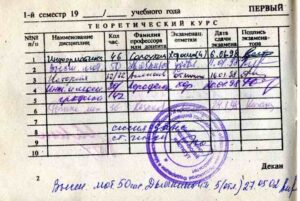In this entry, Olga completes her account (begun in part one of this blog entry), of passing finals week to complete her first year as an undergraduate at Moscow State University. After having missed several classes due to a serious hospitalization, Olga finds that achieving her goals for good grades is particularly challenging.
In the following text, Olga details her experience of taking her last finals and receiving her grades on all five finals she took at Moscow State University. This is part of a series of free Russian lessons sponsored by SRAS called Olga’s Blog. The blog documents – in simplified, modern Russian – Olga’s experience finishing high school, starting college, and living life in Moscow in 2006-2007. The text, links, and format of this resource were last updated in 2023.
Briefly on the Classical Nature of Russian Education
The following text references two interesting elements of Russia’s educational system that may be unfamiliar to students in America.
The first is an emphasis on oral presentations and exams. The US education system, before WWII, also once had more of a focus on building oral skills through presentations and oral exams. This was part of the older Socratic method that once dominated classical education. Oral elements, however, were eventually displaced by written assignments and especially by multiple choice and short answer tests that were easier to grade and arguably more objective. The Soviet system never left its focus on classical education, however, and retained oral elements.
Today, oral exams and presentations are beginning to make a comeback in America the face of the rise of AI and its ability to automatically generate free, seemingly-original, and human-like textual responses to queries. Oral exams and presentations are one way to prevent students from using AI to generate their responses. Many who have “innovated” towards oral requirements have also found that students tend to learn and internalize the material better as well in preparing for such testing.
A second element that may seem unusual is an emphasis on information technology. This is also now becoming more popular in America as information analytics, but is usually part of its own degree or separate certificate program. It is not usually a required part of a humanities program. In Russia, it is standard in nearly all programs and is largely an extension of the classical, Socratic focus that was kept in Russian and Soviet education, which emphasized teaching the logic needed to both formulate questions and generate answers to questions.
A third element, experiential learning, is mentioned briefly a the end as being the topic of next blog entry. Experiential learning is also rising in popularity in the US in response to the rise of freely available AI. It has, like the other elements, long been part of Russian and Soviet education.
Taking Finals in Russia 2: Simplified Russian Text from Olga’s Blog
This is Lesson 10 of Olga’s Blog, a series of intermediate Russian lessons.
Note that:
- All of the bold words and phrases have annotation below.
- Red words and phrases indicate the subject of this blog entry’s grammar lesson.
- *Asterisks indicate slang.
Привет! В прошлый раз я рассказывала о своих экзаменах, но написала только про первые два. Сейчас расскажу об остальных своих экзаменах, как и обещала.
На моей оценке по экономике как раз и отразилось то, что две недели я пролежала в госпитале и не ответила доклад. Экономичка* ставила по посещаемости и докладу, и, увидев пропущенные две недели и отсутствие доклада, влепила мне трояк.* Конечно, я расстроилась. При желании я могла исправить эту тройку, но впереди была история, и времени на подготовку к пересдаче уже не было. Со вступительных экзаменов по истории, честно говоря, я мало чего помнила. Поэтому я положила на коленки учебник и начала учить. По истории я получила пять.

Теперь пришло время информатики – по словам второкурсников, это был самый сложный экзамен, в чем я потом сама убедилась. Он состоял из практической и теоретической частей. Первое – нужно было сделать запрос, отчет или анкету в программе Microsoft Office Access. Это зависело от билета, который попадется. Второе – ответить устно теорию (определения и т.д.). Практику я сделала и ответила билет. Завалилась я на его вопросах. Вопросы были по лекциям, на которые я не попала из-за язвы. Ну, всякое бывает. И после информатики в моей зачетке красовались уже две тройки.
Все равно я была счастлива, что закончила первый курс, сдала зачетку в деканат, и уже свободная отправилась домой. Со своей группой мы договорились вместе отпраздновать конец первого курса. Что мы до сих пор и не сделали – сейчас все ищут работу на лето, потому что практика – обязательная часть учебы.
Но об этом уже в следующий раз!
Vocabulary and Cultural Annotations
Не ответила доклад: I did not present my paper. In Russian education, it is common to not only have to write essays and papers, but to then have to read them out loud or give a related presentation during class.
Экономичка: This slang word refers to Olga’s female economics professor. The official word for one who practices economics as a profession is, of course, экономист. The occurrence of the unofficial feminine version “экономичка” is indicative of a larger debate in Russian society about which professions should be made feminine. While nearly everyone agrees that “врач” (doctor) can never be “врачка,” and while nearly everyone agrees that actors (актеры) and actresses (актрисы) should be referred to by separate names – there is debate over words like экономист. There are, in fact, female economists who use “экономичка” to refer to themselves.
Экономичка ставила по посещаемости и докладу: The economics professor graded according to attendance and the paper. Notice that Olga has simply said “ставила” in this case rather than using the full collocation “ставила оценку.” “Оценка,” or “grade” has been left out of the sentence as being already understood.
Влепила мне трояк: She slapped me with a three. A three is equivalent to a “C” in American grading. As in English, one can feel that Olga perhaps considers the grade slightly unfair by her use of the verb влеплять/влепить.
Коленка: Knee.
По словам второкурсников: according to (the words of) the sophomores. Remember that in Russia, college programs are usually set regiments – so freshman will take almost exactly the same classes that sophomores took the year before.
В чем я потом сама убедилась: Later, I found this out for myself (that the test was the hardest of all).
Запрос: Inquiry. Essentially, this is information constructed to gain other information. It can take many forms. For instance, when you enter search terms in Google, you are making an inquiry; you have entered information about the information you want to find. For Olga, this would mean figuring out how to filter the information in a database to gain the required result.
Отчет: Report. This is a description of what was found, or what would appear at the end of an inquiry.
Анкета: Questionnaire. A list of questions to be answered (from the information within a database, for instance).
Это зависело от билета, который попадется: It depended on the ticket that was had. Remember that the tests are usually individual questions handed out to students.
Ответить устно теорию (определения и т.д.): Recite theory from memory (the definition, etc.). Information theory includes logic such as induction and deduction. Note also the last construction: и т.д. In spoken Russian, this is often left as initials and pronounced as though it were a single word (eh-teh-deh). More often (and more correctly), however, it is spoken in its full form “и так далее” (“and so forth”).
Завалилась я на его вопросах: I flopped (did very poorly) on his questions. Note that this is slang – and very close to English slang in its use of the verb заваливаться/завалиться (to flop, fall, or collapse).
Ну, всякое бывает: Well, these things happen. Note that literally, the phrase would be translated “Well, all types of things happen.”
Практика – обязательная часть учебы: Internships are a required part of the studies. As part of their studies, international relations majors at MGU are required to serve internships with pre-selected organizations offering students “international environments or experiences.” Olga served her internship in a travel agency.
Grammar Focus: Reflexive Verbs (part 2)
Reflexive verbs are traditionally used in languages to form sentences wherein the subject and direct object are the same. These verbs are formed in Russian by adding a suffix to the verb. The suffix used is a reduction of the reflexive pronoun “себя” (oneself): “-ся” is added after verb forms ending in consonants; “-сь” is added after vowels.
English most often forms reflexive sentences by using a reflexive pronoun to indicate the direct object. For example: “The child threw itself to the ground.” However, some verbs are automatically understood to be reflexive in the event that no other direct object is stated. For example, in the sentence “he shaves everyday,” it is understood that he shaves himself everyday.
Russian always indicates reflexive verbs with the suffixes described above. Also, if compared to English, Russian uses the reflexive much more often and for a wider variety of purposes. Reflexive verbs in Russian can be used in six different grammatical functions. This installment of Olga’s Blog will cover three of them. Another three have been covered in the previous installment.
Real reflexive
Real reflexive verbs (sometimes called genuine reflexive verbs), are verbs which operate in the traditional way that reflexive verbs operate: they indicate that the subject is acting on his/her/itself. However, note that Russian sees many verbs as being appropriately reflexive, when in English they are not.
This month’s blog gives several examples of this:
Конечно, я расстроилась. – Of course, I got mad.
Я отправилась домой. – I set off for home.
Завалилась я на его вопросах. – I flopped on his questions.
Note that all three cases would not be reflexive in English – but are in Russian. These are also not lexical reflexive verbs, as covered in the previous instalment of Olga’s Blog. Russian logically sees the actor setting (himself) off, flopping (on himself) and getting (himself) mad – even though, in the last case, the source of the anger (from an English-speakers point of view) is not internal, but from an external situation.
Examples from Literature and the Press:
Я учился в английской школе, находившейся в нескольких километрах от дома. V. Nabokov
Александр Семенович очень расстроился и целый день потратил на то, чтобы созвониться. M. Bulgakov
В жаркий летний день возращался я однажды с охоты на телеге. A. Turgenev
Reciprocal reflexive verbs
Just as -ся imitates the sense of the reflexive pronoun себя on the reflexive verb, it can also imitate the meaning of the reciprocal pronouns друг друга (each other, one another). When it does so, the verb is called a “reciprocal reflexive verb.” These verbs indicate that the actors indicated in the sentence are acting upon each other. The subject of reciprocal reflexive verbs must refer to no mo fewer than two objects.
Мы договорились вместе отпраздновать – We agreed to celebrate with each other
Examples from Literature and the Press:
О, я как брат обняться с бурей был бы рад. A. Lermontov
Всякий раз, когда мы встречались, межу нами возникали нескончаемые споры. A. Turgenev
Middle voice reflexive verbs
Middle voice is a reflexive form which some transitive verbs require when no direct object is used. It is frequently associated with verbs expressing the common but unpleasant activities of people, animals, objects, or even events. However, it is not always negative.
Собака кусается – The dog bites
Examples from Literature and the Press
Цены кусаются, но оно того стоит. Trip Advisor (headline)
Невероятно себя нарядив, пойду по земле, чтоб нравился и жегся V. Maykovsky
More Free Russian Lessons From Olga’s Blog

The Circus in Russia: Olga’s Blog
Olga here turns her attention to the modern Russian circus, describing what it is like to attend a contemporary performance, from the atmosphere inside the circus building to the acts that still draw enthusiastic audiences today. Written in simplified, modern Russian, her account offers a firsthand glimpse into how a traditional cultural institution continues to […]

The Language and History of Caviar: Olga’s Blog
Olga below describes the place of caviar in Russian food culture. In simplified Russian, she describes where the delicacy is harvested from, the major types of caviar, and how the types differ in cost and quality. We also provide an English primer below discussing more of the history of caviar, how it is eaten and […]

Mushrooms in Cultures and Cuisines: Olga’s Blog
Olga below continues her discussion of the deeply held place that mushrooms have in Russian culture. In part one of this discussion, she focused on how and where and find the mushrooms. In part two, below, she discusses how the mushrooms are preserved, prepared, and consumed. A staple of the regional diet for centuries, mushrooms […]

Mushroom Season Has Begun! Olga’s Blog
Olga below discusses the deeply held national tradition of mushroom gathering. An important part of Russian food tradition for many centuries, Russian children are taught in school from an early age to tell the difference between various types of native mushrooms. Many, like Olga, will go with relatives and friends to the woods to put […]

Study Abroad in America for Russians: Olga’s Blog
As part of her major program in international relations at Moscow State University, Olga applied to study abroad in the United States in 2007. As was not uncommon for students applying for study abroad in either direction, Olga hit several bureaucratic snags. What is perhaps most remarkable about the below text, however, is the description […]





